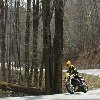| Author | Message | ||
Rocketsprink  |
I'll be installing Crossroad bars on the 12S over the winter. 0 degree ones at that. I remember reading about some problems people were having with the clutch binding up. I remember one guys solution was to lube the hell out of the cable often. Anyone that has the bars ever come up with a better solution/fix to the binding OTHER than a gallon of cable lube a week ?! Thanks. | ||
Wyckedflesh  |
Its called making sure the cable is routed in a way to cut the binding of the cable. If you follow the directions by word instead of picture you will end up with the clutch cable binding up. If you look at the routing of the cables, it will become pretty clear on its own. | ||
Keith  |
Routing is super important. I have also found that the type of lube seems to make a really big difference. | ||
Fran_dog  |
Keith: What lube has work best for your clutch cable? Is it what Buell recommends? | ||
Trojan  |
When I fitted the Crossroads 54mm clip on bars to my 9S I found it difficult to find a suitable route for the clutch cable. I got round this by fitting the cable from a 9R, which has a steel cable guide at the lever end, and by not routing the cable through the hole in the top triple tree. Combined with a Muller Power Clutch it is now extremely light and easy   | ||
Aldaytona  |
Try LUBIT-8 part# 94968-85TV at your local dealer. | ||
Henrik  |
Matt; question on the power clutch: is that the part that replaces the stock ramp piece - has a longer "arm?" Do you have a guestimate of how much lighter the pull is, and how much more throw of the clutch lever is necessary as compared to stock? Thanks Henrik | ||
Trojan  |
Hi Henrik, The pull is around 40% lighter than stock. The Muller clutch doesn't have a longer arm, but has the ramps at a sharper angle, so giving more movement for less effort. It replaces the stock ramp assembly complete. The other version that we supply is the soft clutch. this is a bolt on arm extension that attaches to the stock unit. The lever effort is reduced by around the same amount. | ||
Keith  |
Fran - Believe it or not, I used chain lube. I'm at work right now but will check when I get home. Matt - I too considered using the "R" cable due to the sharp bend the cable has to make as it exits the clutch perch. Can you post a photograph of your cable routing? Also, if the lever is longer, does this reduce clutch travel? Thanks, Keith | ||
Lomax  |
Where can information be found about the power clutch? I did try the "soft clutch" but found it would not fit in the XB12R case. Marc | ||
Henrik  |
So if I understand correctly (risky assumption  ) you end up with same or less lever travel to disengage the clutch, but with lighter clutch pull? ) you end up with same or less lever travel to disengage the clutch, but with lighter clutch pull? Thanks for the info. Henrik | ||
Keith  |
Fran - I used Maxima Chain Wax on the cable. So far, so good... Matt - Any photos to post? | ||
Al_lighton  |
Matt, You wrote that the Muller power clutch "has the ramps at a sharper angle, so giving more movement for less effort" That seems counterintuitive. Wouldn't steeper ramps make it so that it had MORE effort? I'm not following. Shallower ramps would lower the force, but would require greater rotational travel for the same amount of linear clutch spring displacement. In fact, I really have been struggling with figuring out how any of these clutch force reducing devices designed to make the clutch easier can work. On one end, you have a clutch pack that requires a certain amount of displacement to fully disengage the friction discs, and a clutch spring that has a certain amount of force required to overcome to move them that distance, (you know, F=Kx stuff.) The ball ramp mechanism converts that required clutch spring linear motion into rotary motion, the arm on that mechanism provides leverage on that ball ramp mechanism to convert that rotary motion to roughly linear motion at the cable end, the cable takes that linear motion up to the clutch lever, which takes that cable linear motion and converts it back to the rotary motion of the lever, which provides the leverage ratio conversion to provide a low enough force at the hand to disengage the clutch. Every step of the way, you can trade displacement for force by altering leverage ratios. But with fixed force and displacement requirements at the clutch pack, and a fixed rotational angle at the clutch lever end (dictated by hand and lever size), how can you reduce the force required at the hand? When any of the Buells I own are sitting at a traffic light, it takes pretty much the full lever travel (i.e., until the lever hits the grip) to provide enough clutch disengagement to make finding neutral easy. Anything less than full disengagement, and the thing wants to jump from first to second, then second to first, etc, without finding neutral. This is an indication that without full lever travel, the clutch pack is not fully disengaging. So, without altering the clutch itself (i.e. spring force or disengagement distance), how can ANY mechanism, be it using ball ramps, leverage ratios, hydraulic piston area ratios, whatever, still provide the same amount of clutch pack disengagement while simultaneously providing a lower force at the lever? What am I missing? Seems to me the best thing that one can do is minimize friction in the system. Friction is the only other clutch lever force contributor, isn't it? The only two solutions that make any sense to me whatsoever are hydraulic conversions that get rid of cable friction, and hand levers that let you adjust the lever position on the fly so that you get to use the the strong part of your hand when partial clutch disengagement is fine (shifting while moving, away from town) and yet still have full lever travel and therefore clutch disengagement around town where you'll be stopped at lights and such. I'm not trying to start an argument, I'm just trying to understand how the plethora of clutch lever force reducing devices out there can possibly work. Anyone figure this out? Al | ||
Trojan  |
Hi Al, I'm not sure on the physics of exactly how these work better than the stock item, only that they definitely do. I have tried both the Muller clutch and the Soft clutch on our own XB's and both have made significant improvements in lever effort over stock. When you compare the Muller ramps to the stock ones though there appears to be no discernible difference to the naked eye except for the ramp angle. The soft clutch is easier to understand, as it is just a bolt on extension for the lever. I don't know which 'soft clutch' Lomax tried but it wouldn't have been one of ours, as ours is specifically designed to fit inside the casing of the XB9/12. We have also tried a couple of hydraulic conversions and found that, although the clutch action seems smoother, effort is around the same as stock. (Message edited by trojan on December 17, 2004) | ||
Al_lighton  |
Thanks Matt. This little issue has been haunting me since I wrote that...A bunch of people have used these devices, think they work well, and yet I can't figure out why they should...Seems physically impossible for the reasons I wrote above. It occurred to me last night after a few beers that the answer might lie in the biomechanics of the hand that operates the system. While one can't change the overall amount of force/displacement of the system without actually altering the clutch, you can change the linearity of the response. If one was to change the transfer function such that the forces were lower when you are initially pulling in the clutch (with the tips of your fingers, where you lack strength unless you're a studly rock climber), and then increased the forces thru the hand motion where your full hand strength comes in, it would APPEAR to make the clutch pull easier overall, even if the total force over distance was exactly the same. Do you think that is what is going on? Is the lever easier over the entire travel, or is it easier with the lever at the furthest out position, and harder with the lever closest to the grip? Al | ||
Trojan  |
It appears to be easier over the full travel, although like you say, if the hand is stronger later in the pull then you would tend not to notice any increase. Now I've even confused myself! What I can't understand is that, given such an improvement, the factory don't fit this as standard? | ||
Dbird29 |
Couldn't you use a hanging fish scale to pull on the lever and measure the amount of lbs required to disengae the clutch? Similar to the head bearing preload adjustment. Just a thought. DBird |